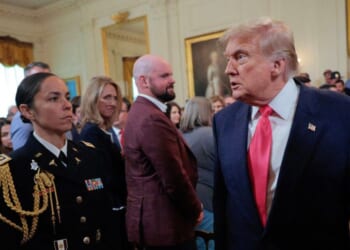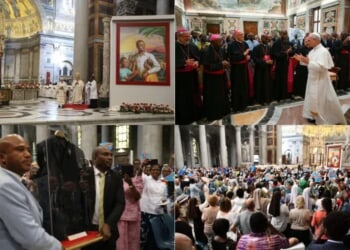Vice President JD Vance gave a speech last Saturday in which he tied together the Trump administration’s immigration policies to the core of American citizenship as envisioned in the country’s founding. Vance argued, “President Trump’s immigration policies are, I believe, the most important part of his successful first six months in the Oval Office.”
Vance addressed the topic of statesmanship and the meaning of American citizenship in the 21st century, emphasizing how principles of immigration policy are pivotal to understanding citizenship and national sovereignty.
The vice president said that citizenship means “recognizing the unique relationship, but also the obligations that we all share with our fellow Americans.” In Vance’s view, healthy citizenship requires fostering and honoring the unique bonds that hold a people together. It’s an active endeavor that must be pursued and safeguarded.
Vance argued that “social bonds form among people who have something in common,” citing the special connection among communities who share the same neighborhoods, the same churches, the same schools. This statement, of course, coincides with Vance’s famously articulated view that the principles of America First align with the Christian concept of the ordo amoris, the proper order of one’s loves. According to Vance, what the Trump administration is doing “is recognizing that if you stop importing millions of foreigners into the country, you allow that social cohesion to form naturally.” (RELATED: The Vice President and the ‘Ordo Amoris’)
But Vance also drove home the point that what holds Americans together is not solely the country’s political principles, even though foundational political principles are crucial. “America is not just an idea,” Vance said. “We’re a particular place with a particular people and a particular set of beliefs and way of life.”
While the “founding vision of the United States of America [is] a beautiful and wonderful founding vision,” Vance said that America is not a “purely credal nation.”
Vance’s claim runs counter to the sensibilities of many people today. For example, former President Joe Biden said last year that “America is an idea.” However, America’s founders — those responsible for formulating America’s central ideas — would join Vance’s side of the argument. In the most well-known passage of The Federalist No. 2, John Jay argues that Americans truly are one people. What they have in common includes the ideas of shared political principles, but their commonalities go beyond that.
Jay writes that Americans are “one united people, a people descended from the same ancestors, speaking the same language, professing the same religion, attached to the same principles of government, very similar in their manners and customs, and who, by their joint counsels, arms, and efforts, fighting side by side throughout a long and bloody war, have nobly established general liberty and independence.”
In the founding vision, American national unity is not simply arbitrary. Mutual affections are required to create and sustain a nation, and that affection cannot be artificially maintained.
Vance drove his point home by stating that “you cannot swap 10 million people from anywhere in the world and expect America to remain unchanged. In the same way, you cannot export the Constitution … to some random country and expect the same kind of government to take hold.”
According to Vance, “The founders of our country understood that perhaps better than anybody.”
This argument is almost a direct paraphrase from Thomas Jefferson’s Notes on the State of Virginia, originally published in 1785. In Query VIII, Jefferson remarks upon the unique nature of the American spirit and says that America’s principles “perhaps are more peculiar than those of any other in the universe.” He wrote that our government “is a composition of the freest principles of the English constitution, with others derived from natural right and natural reason.”
Because America possesses a distinct identity, Jefferson cautions against importing masses of foreigners who will necessarily “bring with them” traditions incompatible with American natural law principles, which would “render [the American character] a heterogeneous, incoherent, distracted mass.”
He asks, “Suppose 20 millions of republican Americans [were] thrown all of a sudden into France, what would be the condition of that kingdom?” Jefferson says that it would be “more turbulent, less happy, less strong.” In other words, Jefferson affirms that you cannot swap millions of people from different countries and expect them to remain unchanged. Jefferson and the rest of the Founders understood the significance of both shared political principles and shared traditions, culture, and historical experiences.
Vance also discussed what this issue means for American citizenship today. He said that because American elites have failed to promote and maintain a common identity, “we are confronted with a society that has less in common than ever and whose cultural leaders seem totally uninterested in fixing that.”
A diverse nation like America requires statesmanship to build “institutions that allow us to thrive and build a common sense of purpose and meaning as Americans,” according to Vance. His speech reminds us that it’s the task of thoughtful conservatives in positions of power and in the culture to go about rebuilding that sense of a common American identity, and the Trump administration’s policies present an effort to pursue this project.
READ MORE by Jonah Apel:
‘There Needs To Be Blood’: House Democrats Are Frightened by the Radicalism of Their Own Base
No, the Left Has Not Discovered Its ‘Hillbilly Elegy for People Who Hate JD Vance’



![Coast Guard Rescue Swimmer Credited with Saving 165 People [WATCH]](https://www.right2024.com/wp-content/uploads/2025/07/Coast-Guard-Rescue-Swimmer-Credited-with-Saving-165-People-WATCH-350x250.jpg)









